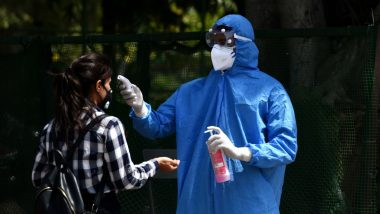New Delhi, July 29: Delhi's Indraprastha Apollo Hospital has seen a 100 per cent rise in complaints of hair loss among coronavirus patients, doctors said on Thursday. Normally, according to a spokesperson, the private hospital in South Delhi would record four to five complaints of hair loss a week.
However, hair loss cases "started increasing from mid-May and a consolidated report says we have been seeing double the number of cases since then", the spokesperson said.
Usually, COVID-19 patients experience hair loss a month after recovering from the disease. In some cases, hair loss is observed during the infection period, too, doctors said. Trauma Patients With COVID-19 Face Greater Risk of Complications, Death, Says Research.
Deficiencies due to change in dietary habits, fever during the infection, stress, anxiety, sudden hormonal changes and persistent post-Covid inflammatory reactions are some of the reasons for the temporary hair loss, they said.
Dr Shahin Nooreyezdan, senior consultant, cosmetic and plastic surgery, Indraprastha Apollo Hospital, said, "We have seen a two-fold rise in the number of patients complaining of problems related to hair loss.
"Post-Covid inflammation has been a major contributor. Deficiencies due to a compromised nutritional intake, sudden changes in weight, hormonal disturbances and reduced vitamin D and B12 levels are some of the major reasons for the loss of large volumes of hair loss post-infection," he said.
Dr Kuldeep Singh, senior consultant, cosmetology and plastic surgery, said, "Hair loss post-Covid is temporary in nature and is due to a condition called Telogen Effluvium. It is a result of the shock the body sustains after suffering from fever and other symptoms during COVID-19."
Normally a person can lose up to 100 hair per day, but it can increase to 300-400 hair per day due to Telogen Effluvium, he said. The doctors suggested that after recovering from COVID-19, one should have a nutritious diet along with natural edible sources of vitamins and iron. Iron deficiency can accentuate hair loss, while a protein-rich, balanced diet reduces hair fall. What is Brain Fog? Know Everything About This Post COVID-19 Complication Experienced by Coronavirus Patients Among Other Symptoms.
People should approach a doctor only if excessive hair loss persists even after consuming a nutritious diet for five to six weeks. Some common hair care solutions that can be administered to prevent excessive hair loss are -- use of mild, paraben and sulphate-free shampoos, keeping a close check on the itchy and flaky scalp, refraining from oiling and massaging the scalp, using a wide-tooth comb and seeking immediate medical intervention in case of development of bald patches and huge volume of hair fall.
One should avoid stress, meditate, eat healthy, take natural nutritional supplements, avoid heat and chemicals for hairstyling and refrain from following a sedentary lifestyle, the doctors said.
(This is an unedited and auto-generated story from Syndicated News feed, LatestLY Staff may not have modified or edited the content body)













 Quickly
Quickly




















